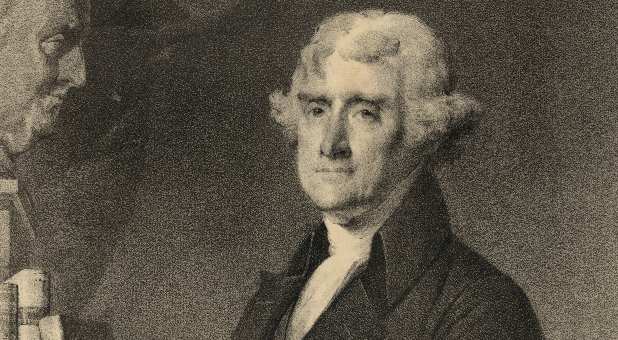Thomas Jefferson’s Prominent Role in Ending Slavery in America
Thomas Jefferson is in the crosshairs of those on the Left who are demanding the removal of his statues from public places and the removal of his name from public schools. After all, was not Jefferson an evil, white slaveowner?
We must remember that the goal of the Left is not to understand history. Their goal is to control history and manipulate it to serve their social-political agenda. In George Orwell’s 1984, Big Brother censored and manipulated history to make his own regime appear to be a stark improvement on the past. And so it is with all secularist, authoritarian movements.
The truth is that at a time when slavery was accepted and practiced in Africa, Asia, the Middle East and most of the world, Jefferson, and virtually all of America’s Founders, turned against it. This is clear from both their public statements and their private correspondence. The eminent economist and historian, Dr. Thomas Sowell, who happens to be Black, has written of this, saying:
“Among those who turned against slavery in the 18th-century were George Washington, Thomas Jefferson, Patrick Henry, and other American leaders. You could research all of 18th-century Africa or Asia or the Middle East without finding any comparable rejection of slavery there” (Hyatt, 1726: TheYear that Defined America, 90).
The occasion for this unique turn was the 18th-century religious movement in colonial America known as the Great Awakening. A characteristic of this Awakening was the anti-slavery sentiments that prevailed throughout the colonies. By the time of the writing of the Declaration of Independence in 1776, virtually every Founder had come to agree with John Adams who said:
“Every measure of prudence ought to be assumed for the eventual total extirpation of slavery from the United States … I have throughout my whole life held the practice of slavery in abhorrence” (Hyatt, Abolitionist Founding Fathers, 36).
Jefferson was the primary author of the Declaration of Independence and the nation’s third president. Although born in a slave-holding colony and into a slave-holding family, he came to see the evils of slavery and began calling for its elimination, even while holding slaves.
For example, in a document for Virginia delegates to the Continental Congress, Jefferson called for an end to the slave trade, writing, “The abolition of domestic slavery is the great object of desire in these colonies where it was unhappily introduced in our infant state.”
In an early draft of the Declaration of Independence, Jefferson excoriated the King of England and accused him of introducing slavery into the colonies, saying:
“He has waged cruel war against human nature itself, violating its most sacred rights of life and liberty in the persons of a distant people who never offended him, captivating them and carrying them into slavery in another hemisphere” (Hyatt, Abolitionist Founding Fathers, 44).
Although the exact words of the above statement did not make it to the final draft, the principles of “life and liberty” for “all men” did. Jefferson wrote:
“We hold these truths to be self-evident, that all men are created equal, that they are endowed by their Creator with certain unalienable Rights, that among these are Life, Liberty, and the pursuit of Happiness.”
America’s founding generation understood this statement to be a direct attack on the institution of slavery, and abolitionists used it in their attacks on that institution. The famous abolitionist and former slave, Frederick Douglass (1818-95), understood it as such. In a July 4th speech in 1852, Douglass referred to the Declaration of Independence and then exhorted his audience:
“The principles contained in that instrument are saving principles. Stand by those principles, be true to them on all occasions, in all places, against all foes, and at whatever cost.”
In his early years, Douglass had concluded that he had no place in America because of the enslavement of his people; but after years of investigative research he completely changed his thinking. He realized that the continuation of slavery was not the desire of the Founders and that they had put their lives on the line by declaring independence from Great Britain and challenging slavery by declaring that “all men are created equal” and have a God-given right for life, liberty and the pursuit of happiness.
For the rest of this article, please visit biblicalawakeningblogspot.com. {eoa}
This article is derived from the books, Abolitionist Founding Fathers and 1726: The Year that Defined America, by Dr. Eddie Hyatt, who has a calling and commission to point America back to her birth out of a great 18th century Christian Awakening. These and other books by him are available from Amazon and his website at www.eddiehyatt.com.







































